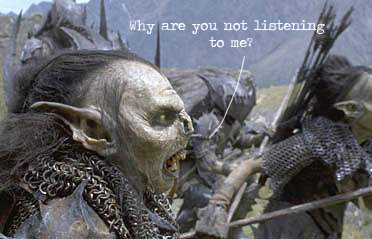I am currently finishing my dissertation on gender and games, and my boyfriend proofread my draft last night. Somehow, we got into an argument about whether two orcs were objectified. I meant the female orc was objectified, whilst my boyfriend viewed the male orc as objectified. It ended after an image-search of more orcs, and me going ‘OBJECTIFIED. NOT OBJECTIFIED. Don’t you see it?’.
 In my previous post, Lauren mentioned the frustration when someone is not listening. Ironically, I realise that I do this myself sometimes. As I will hopefully start working soon, I am convinced that I won’t be able to end work-place disagreements with Google-searches and rants. Or that I should even focus on ‘winning’ each disagreement.
In my previous post, Lauren mentioned the frustration when someone is not listening. Ironically, I realise that I do this myself sometimes. As I will hopefully start working soon, I am convinced that I won’t be able to end work-place disagreements with Google-searches and rants. Or that I should even focus on ‘winning’ each disagreement.
Think of an argument where you felt frustrated. Was it the other person’s view that upset you, or because you felt unheard? Did you acknowledge their views?
Lack of empathy causes many conflicts, which arise when we perceive that someone does not care about our views or interests (Buchanan and Huczynski 2010: 791). The mind-set of ‘winning’ the disagreement therefore escalates into a conflict, because it is difficult to move forward when you end up talking beside each other, and the communication is one-way.
Active listening is a way to integrate empathy and open up to others’ views. It builds on interpreting and reflecting upon what is being said, as well as rapport with the other person by paying attention, paraphrasing and feeding back the message. Ultimately, it is about interpreting and exploring the information you receive before responding (Fisher and Shapiro 2007: 27).
We are often taught to listen for information, not to understand how others feel. It is difficult to accept other perspectives when we are convinced ours is right. We then tend to judge what others say through an emotional filter, based on if it is in line with, or against our interests. We also think up counter-arguments whilst others are speaking, like I did last night (Nichols and Stevens 1999: 3, 7). This means we risk missing the actual message, and people feel unheard or unacknowledged like my boyfriend probably did.
Listening is the first step towards solving conflicts and avoiding orc-related grudges. This does not mean that you agree with the other person, but negotiation won’t take place until you both understand each other.
For bibliography and further reading, click here.
How can we negotiate more effectively using empathy? What are important listening skills?
